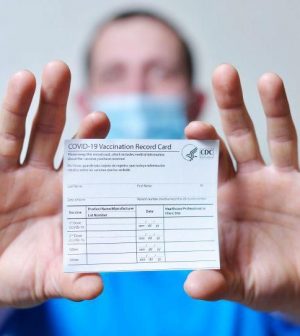- Recognizing the Signs of Hypothyroidism
- 10 Strategies to Overcome Insomnia
- Could Artificial Sweeteners Be Aging the Brain Faster?
- Techniques for Soothing Your Nervous System
- Does the Water in Your House Smell Funny? Here’s Why
- Can a Daily Dose of Apple Cider Vinegar Actually Aid Weight Loss?
- 6 Health Beverages That Can Actually Spike Your Blood Sugar
- Treatment Options for Social Anxiety Disorder
- Understanding the Connection Between Anxiety and Depression
- How Daily Prunes Can Influence Cholesterol and Inflammation
You Got Your COVID Shot: What to Do With That Vaccine Card

More than 147 million Americans have gotten at least one dose of a COVID-19 vaccine, and they all have the same question:
What do I do with this immunization card they just handed me?
Whatever you do, don’t throw it out, experts say.
An electronic record of your vaccination should be filed with your state by whoever gave you the jab, but holding on to your own paper record will likely prove useful.
“Since there’s so much discussion about different entities requiring evidence of vaccination, who knows how that will play out?” said Dr. William Schaffner, professor of infectious diseases at Vanderbilt Medical Center in Nashville, Tenn. “At the moment, the count is over 100 colleges and universities have informed their students that when they return in the fall they’ll have to present evidence of having been vaccinated.”
“There may be other circumstances where that comes up in the not-too-distant future, so do keep it in a safe place. You may need it in the near-term future to do this or that,” Schaffner continued.
Store your completed COVID vaccine card with your other important papers, experts recommend.
For example, Dr. Amesh Adalja — a senior scholar with the Johns Hopkins Center for Health Security in Baltimore — keeps his tucked into his passport, alongside a very similar vaccine card for yellow fever.
Experts differ on whether or not you should get the card laminated.
“Some people have laminated it, but there’s a caution: A colleague of mine tried to laminate it themselves and messed it up,” Schaffner said. “Then they had to go out and get a new card, which was a bother.”
Office supply stores such as Staples and Office Depot are offering to laminate cards free of charge, but you should only have to pay a few bucks to get a card laminated at your neighborhood copy center, Schaffner said.
Schaffner and Adalja have not gotten their cards laminated, because more might need to be added to their personal COVID vaccine record.
“I’ve put it in a little plastic sleeve, actually in a baggie, and I’ve put it among my other safe papers. If I need it, then it will be available,” Schaffner said. “On mine, there’s space on the back for a booster if I ever need it. That’s important, and that’s one of the reasons I haven’t laminated it.”
Others say if you get your card laminated after you are fully immunized, it shouldn’t be a big deal because more sophisticated record-keeping systems — a smartphone app, for instance — are currently in development.
“I would laminate it because by the time a booster comes along, the technology will have evolved,” Maureen Miller, a professor of epidemiology at Columbia University’s Mailman School of Public Health, told CBS News.
All the experts agree that snapping a pic of your completed card and keeping it on your phone is a good idea, so you have a readily available copy on hand. If you don’t have a smartphone, keep a photocopy of the original card in your purse or wallet.
You also should be sure to notify your primary care doc that you’ve gotten the vaccine, as well as the VA or Medicare, to keep your personal medical record up to date. They might ask you for a copy of your vaccine card, so be prepared to fax or email a copy.
But experts differ on whether or not you should share that picture on social media like Facebook or Twitter, to share your good news and encourage others to take the jab.
“I did share it on social media in order to show people that I was vaccinated and encourage them to do the same,” Adalja said.
However, you might want to take steps to obscure any information that might be used by identity thieves.
“I would not post it to social media with my birthday showing,” epidemiologist Danielle Ompad, a professor at the NYU School of Global Public Health, told CBS News. “It is a unique identifier that could allow somebody to potentially steal your identity, so I would first be careful about that.”
Don’t worry if you lose your card, or if you’ve already tossed it out after completing your vaccination series. As mentioned before, an electronic record of your vaccination is sent to your state’s health department; ask them for a replacement.
More information
The U.S. Centers for Disease Control and Prevention have more about state immunization information systems.
SOURCES: William Schaffner, MD, professor, Preventive Medicine and Division of Infectious Diseases, Vanderbilt Medical Center, Nashville, Tenn.; Amesh Adalja, MD, senior scholar, Johns Hopkins Center for Health Security, Baltimore; CBS News
Source: HealthDay
Copyright © 2026 HealthDay. All rights reserved.










